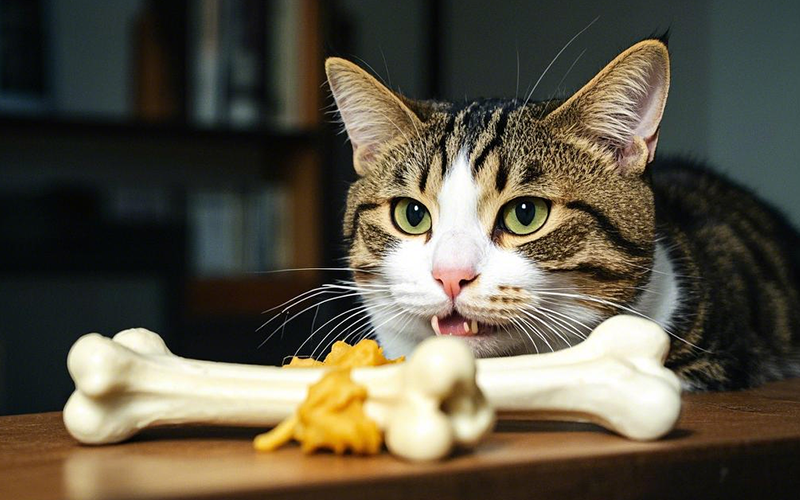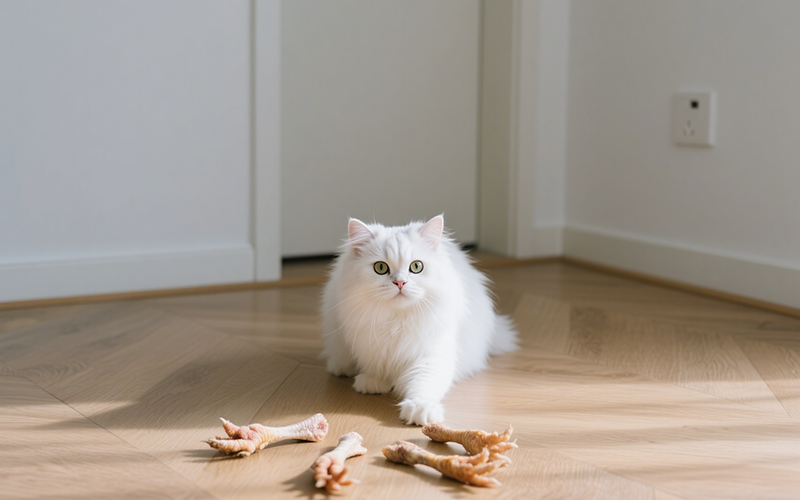Can Cats Eat Bones? A Guide to Safe Snacking for Your Cat
- 11 Mar 2025 13:46
As a pet owner, it’s common to wonder about certain foods, especially when it comes to feeding your cat. One question that often comes up is: Can cats eat bones? The short answer is no, bones can be dangerous for cats. While bones may seem like a natural treat, there are several important factors to consider to ensure your cat stays safe.

Why Are Bones Dangerous for Cats? ⚠️
Even though many animals in the wild consume bones, they are not always safe for domesticated cats. Here are the reasons why you should avoid feeding your cat bones:
1. Choking Hazard 🚨
One of the biggest risks of giving bones to cats is that they can pose a choking hazard. Cats often swallow their food quickly, and if they try to swallow a bone that is too large or sharp, it could get stuck in their throat, causing them to choke.
2. Broken Teeth 🦷
Bones, especially hard ones, can break your cat’s teeth. Cats are not equipped to chew on hard bones like wild animals. If your cat chews on a bone that’s too hard, it could cause cracked or broken teeth, which can be extremely painful and require veterinary treatment.
3. Splintering ⚠️
Cooked bones, in particular, are highly prone to splintering. When bones break into small, sharp pieces, they can pierce your cat’s mouth, esophagus, or digestive tract, potentially causing serious injury or infection. Even raw bones can splinter under pressure, especially if your cat chews on them for too long.
4. Digestive Issues 💩
Bones can cause serious digestive blockages. If a bone piece is too large for your cat’s stomach to handle, it could become lodged in their intestines, leading to a blockage. This is a very serious condition that requires immediate veterinary attention and often results in surgery.
5. Constipation 🐾
If your cat eats too many bones, especially small fragments, they may experience constipation. Bones can be difficult for your cat’s digestive system to break down, leading to discomfort and possible stool problems.
Are Raw Bones Any Safer Than Cooked Bones? 🥩
While raw bones are often considered safer than cooked ones, they still carry risks. Raw bones, like those from chicken or beef, may be softer than cooked bones, but they still pose potential dangers:
Choking: Even raw bones can get lodged in your cat’s throat if they’re not chewed properly.
Bacterial Contamination: Raw bones can carry bacteria, such as Salmonella or E. coli, which can make your cat sick. These bacteria can also be transmitted to humans, posing a health risk.
Digestive Upsets: Raw bones can still cause digestive issues, particularly if your cat swallows large pieces that their system cannot process.
What Should You Feed Your Cat Instead of Bones? 🍗
If your cat enjoys chewing or gnawing on something, there are plenty of safe alternatives that won’t pose a threat to their health:
1. Cat-Specific Chew Toys 🧸
There are many chew toys specifically designed for cats that can satisfy their chewing instincts without the risks associated with bones. These toys are made of safe materials and can help keep your cat’s teeth healthy while preventing boredom.
2. Meat with Soft Bones (Carefully Prepared) 🍗
While bones themselves should be avoided, you can offer your cat meat with small, soft bones like those found in chicken wings or ribs, but be sure to carefully remove any large, hard bones. These can provide some of the nutritional benefits that bones might offer, without the risks of splintering or choking.
3. Dental Treats 🦷
There are specially designed dental treats that can help clean your cat’s teeth while also satisfying their need to chew. These treats come in different shapes and sizes and are safe for cats.
4. Frozen Meat 🍖
If your cat enjoys gnawing on food, consider offering frozen meat, such as chicken or beef. This can provide a good alternative to bones while still offering some texture for your cat to chew on.
5. Cat-Safe Raw Food 🍽
If you're interested in feeding your cat raw food, make sure to choose raw food diets specifically formulated for cats, which are balanced in nutrients and do not contain harmful bones. Some brands provide safe, nutrient-dense raw food without bones, offering a safer alternative to feeding raw meat with bones.
How to Safely Care for Your Cat’s Teeth 🪥
Rather than relying on bones to keep your cat’s teeth healthy, there are safer alternatives to consider:
Regular brushing: Brushing your cat’s teeth with cat-safe toothpaste can help prevent plaque buildup and maintain good oral hygiene.
Dental treats and diets: Specially formulated dental treats and foods can help reduce plaque and tartar while satisfying your cat’s need to chew.
Regular vet check-ups: It’s important to schedule regular veterinary visits to monitor your cat’s oral health. Your vet can check for any dental issues and recommend appropriate treatments.
Conclusion 🎉
In conclusion, while bones are not safe for cats, there are plenty of safe and healthy alternatives to provide your cat with the enjoyment of chewing and satisfying their natural instincts. Choking, tooth damage, and digestive issues are significant risks associated with feeding bones to cats, so it’s best to avoid them entirely.
If you're ever unsure about what’s safe for your cat to eat or need help with your cat’s health, you can turn to PettureX, an AI-powered pet health assistant. PettureX offers 24/7 consultations and can guide you on safe feeding practices, dental care, and much more! 🐾
Related

Can Cats Eat Egg Yolk Raw? A Vet's In-Depth Guide to Feline Nutrition & Safety
- 10 Jun 2025
Can Cats Eat Dog Kibble? Unpacking the Nutritional Mismatch!
- 29 May 2025
Can Cats Eat Deli Turkey? Slicing Through the Facts for Your Feline!
- 29 May 2025
Can Cats Eat Deer Meat? Exploring Venison for Your Feline!
- 28 May 2025
Can Cats Eat Corned Beef? Unpacking This Salty Human Delicacy!
- 28 May 2025
Can Cats Eat Cooked Rice? The Grain Truth for Your Feline Friend!
- 27 May 2025
Can Cats Eat Cornbread? A Crumb of Truth for Curious Cat Owners!
- 27 May 2025
Can Cats Eat Cooked Meat? Sizzling Facts for Your Feline's Feast!
- 26 May 2025
Can Cats Eat Chili? Spicing Up the Truth About This Human Dish!
- 26 May 2025
Can Cats Eat Chicken Feet? A Paw-sitive or Negative Treat?
- 24 May 2025
